June 20, 2025 – Day 1 of JTS Workshop in Zhemgang, Bhutan
Hello. Today marks the first day of the sustainable development workshop jointly organized by JTS and the Bhutanese government in Zhemgang.
After completing his morning practice, Sunim had breakfast at 7 AM with food prepared at the accommodation. At 9:15 AM, he departed from the accommodation to the workshop venue at the Zhemgang Startup Center. Although it was within walking distance, due to rain and some members of the group not having umbrellas, they traveled by car. At 9:30 AM, Sunim greeted the District Governor of Zhemgang at the center entrance and entered the auditorium where the workshop was being held. Seventy-five participants were seated, waiting for the session to begin.
Zhemgang District is one of the most underdeveloped regions in Bhutan. This workshop brought together administrative officials and village representatives from the region to prepare for the main project over the next three years and establish concrete implementation plans. Zhemgang District has 8 gewogs, with each gewog containing 5 chiwogs. All the gups (gewog representatives) and tshogpas (chiwog representatives) attended.
The workshop began with a welcome address from the District Governor of Zhemgang.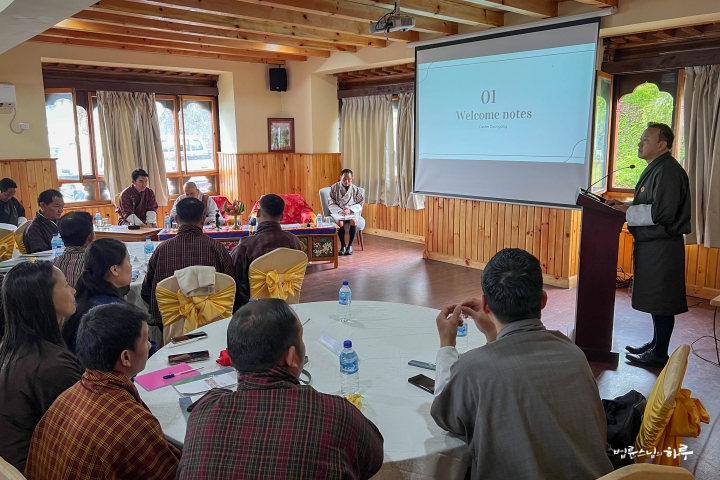
“Zhemgang District is one of the regions with the highest poverty rate in Bhutan, currently standing at 41.6%. We aim to reduce this to below 15% by 2029, and the project we are starting together today is at the heart of this strategy.
As Sunim said, ‘If the residents say they will do it, I will support them unconditionally.’ The most important thing is the mindset of all residents to genuinely participate and put this into practice. This Buddhist service is not about us receiving help from Sunim, but about creating opportunities together. I deeply appreciate Sunim’s compassion and dedication, and I hope this gathering becomes the starting point for changing Zhemgang’s future.”
This was followed by Sunim’s opening remarks. Sunim began his speech after taking refuge in the Three Jewels in Pali.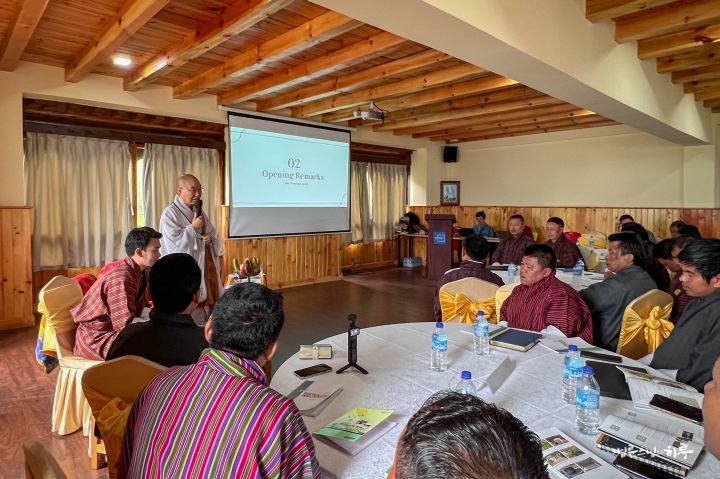
“Please don’t think of this work as too difficult. I am pursuing this as a Buddhist service. When we usually build a large temple, it costs about 5 million dollars. We need to construct large buildings, create large Buddha statues, apply gold leaf to the statues, and build quarters for monks. Building such a large temple requires a lot of money. But what is the highest form of Buddhist service? We can infer this from the Buddha’s words in the scriptures.
The Buddha was born a prince but renounced his throne to become a practitioner. When leaving Kapilavastu, he vowed, ‘If I cannot find the path for all sentient beings to be free from suffering, I will not return to this castle.’ The Buddha’s goal was for sentient beings to be free from all suffering. Therefore, the highest Buddhist service is not building temples or making Buddha statues, but ensuring that sentient beings are free from suffering. Also, in the Vimalakirti Sutra, there is this story: When Layman Vimalakirti was ill and bedridden, Bodhisattva Manjushri visited him. When asked, ‘How is your illness?’ Vimalakirti replied, ‘Since sentient beings are ill, I am also ill.’ When asked, ‘When will your illness be cured?’ Vimalakirti answered, ‘When the illness of sentient beings is cured, my illness will also be cured.’ This is Buddhist philosophy.
To live, people must eat. They must drink water. To sleep, they need shelter. They need basic education. When sick, they need medical treatment. These are the basic conditions of life. If there are people who lack even these basic conditions, we must help them regardless of their race, class, or gender – this is the principle of humanitarian aid in the UN Charter. At the very least, those born as human beings should be able to maintain a basic standard of living. Eliminating the suffering of sentient beings means reducing the percentage of people in absolute poverty to zero.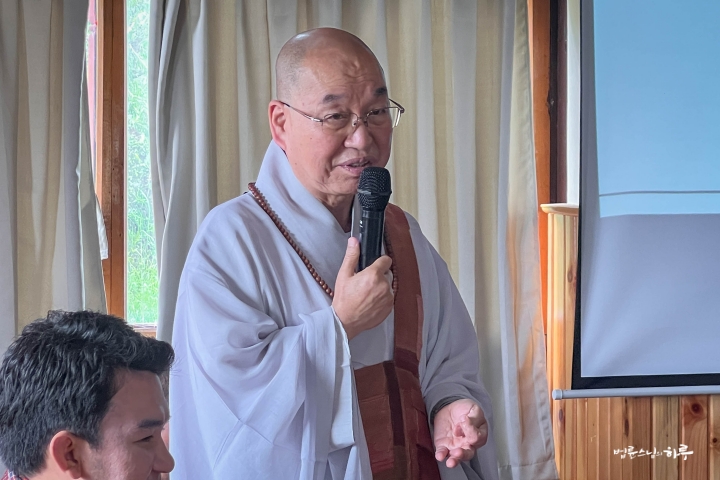
The Greatest Act of Buddhist Devotion is to Relieve the Suffering of Sentient Beings.
Zhemgang District has the highest poverty rate in Bhutan. The poverty rate is extremely high, reaching 41 percent. Even if we cannot completely eliminate absolute poverty, we must reduce it by at least half. If we can do that, there is no greater Buddhist service than this. Each suffering sentient being comes together to form this world. Eliminating the suffering of each individual is equivalent to the appearance of a Buddha. In other words, this is creating the Pure Land, the land of Buddha.
This Buddhist service is not about building large temples or creating grand Buddha statues, but about eliminating the suffering of sentient beings. If I were to build a large temple, I would visit multiple times with technicians to inspect how to construct the temple and how to create the Buddha statue. Similarly, because I consider this work in Zhemgang District to be a Buddhist service, I have made my 11th visit and conducted pilot projects. This is because I needed to personally inspect how to conduct this Buddhist service to alleviate the suffering of sentient beings. So I hope you will approach this work with the mindset of becoming professional technicians in Buddhist service. I am also doing this work thinking that I am building a great invisible temple in Zhemgang District.
The funds for this Buddhist service do not include a single penny from the Korean government or large corporations. All of it has been collected from individuals contributing $10 each month. Usually, when temples receive such donations, they build large temples. However, this time, instead of building Buddha statues or temples, we are conducting a Buddhist service to alleviate the suffering of the Bhutanese people. That is why I believe this Buddhist service will be successfully accomplished through the Buddha’s blessing. 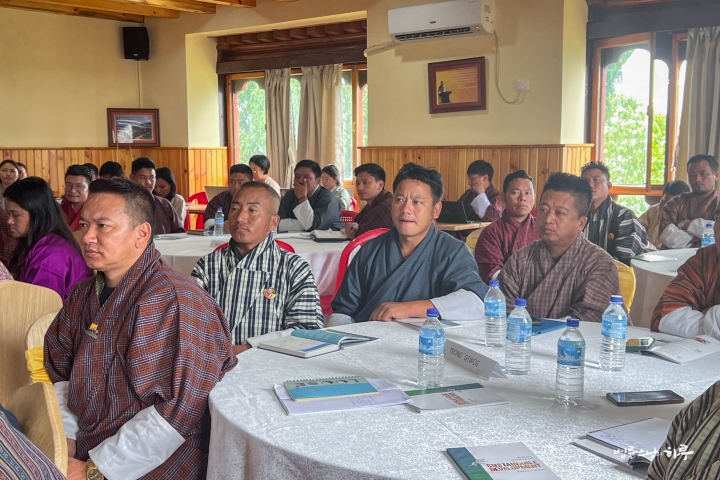
If someone else does all this work for us, we become beggars who just receive handouts. We can only be called practitioners when we solve everything ourselves. However, since you say you’re too poor to afford materials, JTS will provide the materials. What’s important is not just that houses are built, but that you build them yourselves. When the entire village cooperates to build houses for those who cannot build due to disabilities or old age, a village community is formed.
Let’s make it so that in your villages, no one is without a house, no one has a dirty house, the roads in every neighborhood are cleanly paved, the fields have fences, there’s sufficient access to running water, the schools are clean, the elderly can see and hear well, and even if the roads aren’t completely paved, vehicles can still pass through. This isn’t something someone else will do for you – let’s have the villagers create this themselves. Let’s try to make all of Zhemgang Dzongkhag like a temple. Today’s workshop is a place to put our heads together and discuss how to create such a temple. This Buddhist work should be done with smiles, not with difficulty. No matter how hard it is, we should do it while chanting ‘Om Mani Padme Hum.’ Doing this Buddhist work won’t give you a higher salary or personal benefit. However, if we create this together with the heart of a bodhisattva, we will accumulate great merit.”
Following this, participant introductions began at 10:15 AM.
“Hello. I’m Sonam Jampo, Lhebati Tshogpa of Goshing Gewog. Nice to meet you.”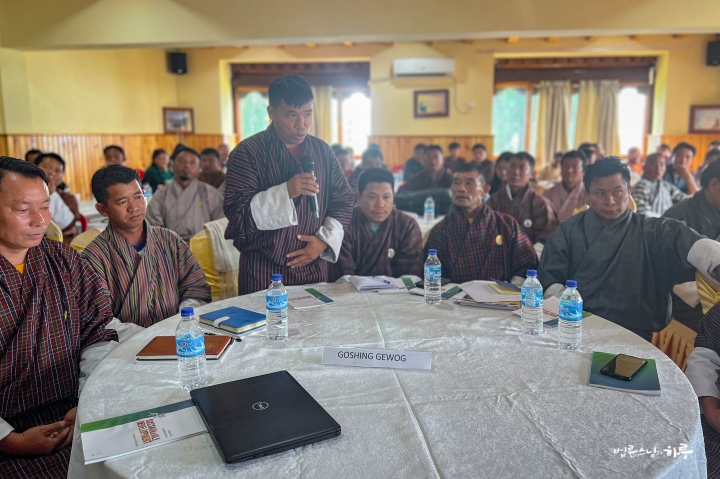
Sunim looked at each participant’s face as they stated their names and warmly greeted them with his eyes.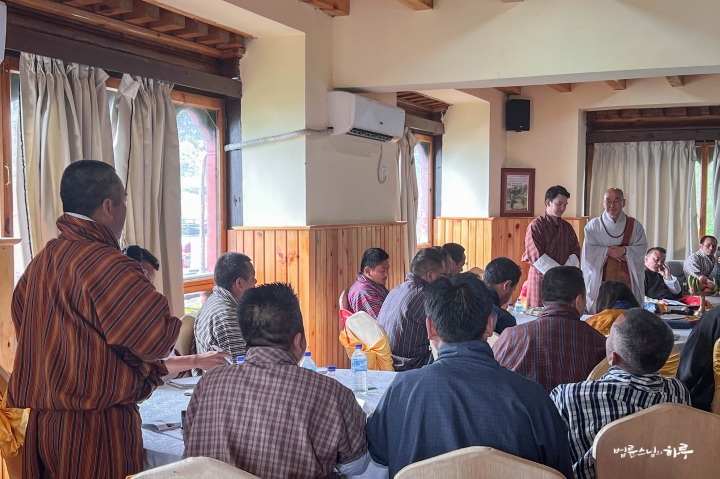
Afterward, Park Si-hyun briefly explained the progress of JTS projects in Bhutan. This was followed by a video of the pilot project and a presentation by the planning officer on the pilot project’s progress. The District Governor summarized this and once again emphasized the importance of the project and the core value of community participation.
At 11 AM, participants took a short break with a cup of tea. Sunim also had tea and conversed with the the District Governor, Continuing from yesterday, the Governor asked Sunim a question.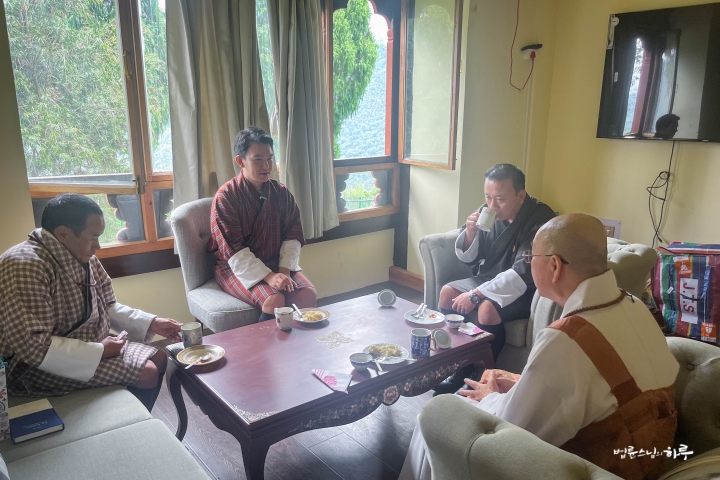
A World where Happiness, not Money, is at the Center — is it Possible??
Sunim answered. The two continued their conversation, empathizing with each other’s thoughts.
“That’s right. When GNH first came out, people around the world weren’t very interested. But times have changed now. On the outside, everyone seems to be eating well, dressing well, and sleeping well, so it appears there’s no reason to suffer — but in reality, that’s not the case. These days, the criteria for investment is changing from how much production it generates to how much it contributes to people’s happiness. Countries like Finland and New Zealand are already showing such trends. The world is now beginning to pay attention to the concept of GNH. In fact, while the project JTS is doing in Bhutan looks like poverty eradication on the surface, what’s really important is raising GNH (Gross National Happiness). When people accomplish something themselves, they feel pride, and that creates real happiness.
Most importantly, the biggest variable these days is the climate crisis. We think we’ll be happy if we produce a lot of material goods, but that production is actually destroying the Earth. We need to find a new path. The problem is that we’ve been pursuing happiness through consumption. Now we need to ask people again, ‘Can we be happy while reducing consumption?’ I think we can find that answer in the Buddha’s teachings.”
“That’s right. GNH was first mentioned by the 4th King in 1974 when he was 19 years old. He realized at that age that people cannot be happy with material things alone. However, at that time it existed only as an ideology, and concrete implementation was lacking. Now capitalism is all about competition. In the future, any business that comes in must be environmentally friendly and consider people’s happiness. That’s the path Bhutan must take.”
“You’re absolutely right. But whether this project succeeds or fails, we’ll only know by trying. It’s time to try something new, not the way we’ve been doing things. Even if we fail, it’s a process of opening a new path. We can examine why we failed and try again. In the long view of history, even failure isn’t failure. From the perspective of practice, whether it’s success or failure isn’t that important. The ‘process’ toward success is what matters. Thinking this way, we won’t suffer and can ultimately reach nirvana.”
After finishing the tea conversation, they returned to the workshop.
At 11:40 AM, Park Si-hyun introduced the history and philosophy of JTS as an organization, and its direction of activities in Bhutan.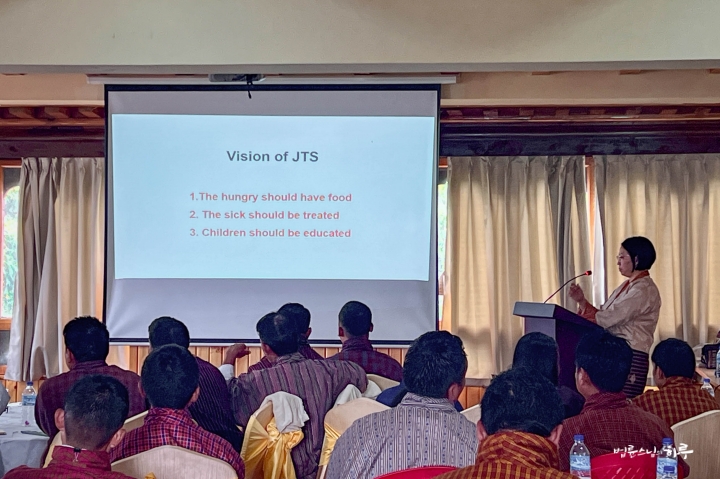
From 12:10 PM, Sunim’s lecture continued. Sunim explained the purpose of the workshop, JTS’s operational philosophy, the direction of the project, and the principles of community-centered implementation.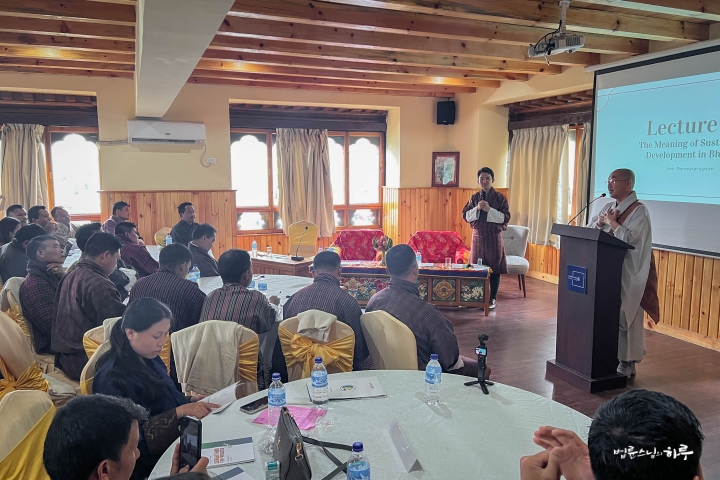
“In this workshop, we’ve decided to have time for each of you to present what you will do in your village over the next year. The initial plan was to support $1 million per year for 5 years, totaling $5 million. However, after looking around the sites, I judged that building houses and improving living conditions could be resolved within 3 years rather than taking 5 years. So we’ve changed the plan to execute the entire budget within 3 years. After executing the budget, we need to evaluate the results. If the project results are effective, it can be expanded to other dzongkhags. Conversely, if it’s judged to be ineffective, the project must be stopped.
This Project will be Discontinued if Local People do not Engage Themselves.
One of JTS’s support principles is that residents must participate directly. If residents say they won’t participate, the project ends. If someone says they’ll do all the work for you, residents might make endless demands. But since JTS only provides budget support when residents participate directly, the project can only proceed within the scope that residents can handle themselves. This is JTS’s basic principle.
JTS is an affiliate of Jungto Society, a Buddhist organization. Jungto Society is a practice organization that aims for individual happiness by following the Buddha’s teachings through practice. Therefore, Jungto Society rejects secular values that pursue happiness through material consumption. If one could become happy by having high status, lots of wealth, and popularity, the Buddha would have had no reason to leave home. The Buddha was convinced that one could never be happy through fulfilling desires, which is why he abandoned the throne and became a monastic practitioner. In this regard, many Buddhist organizations today teaching that ‘if you pray to Buddha for blessings, your status will rise and you’ll receive blessings’ goes against Buddhism’s fundamental teachings.
According to the Buddha’s teachings, in the era of climate crisis, we should actually reduce consumption. That’s why Jungto Society practices movements like stopping consumption, living frugally, and eating less in Korea. JTS also doesn’t simply provide money from a development perspective. Then why does JTS conduct poverty eradication movements in Bhutan? It’s because we believe that humans need to have at least the minimum conditions to eat, wear clothes, and sleep resolved. When sick, one must receive treatment, and children must learn at the proper time. That’s why JTS helps poor people who don’t even meet basic living standards. Those who want to wear better clothes and live in better houses cannot receive JTS support. If you want to build a bigger house, you must solve that with your own money, not JTS’s budget. You all need to recognize that this project is for those who cannot maintain basic living conditions.
Why Did JTS Start This Work in Bhutan, the ‘Land of Happiness’?
You might wonder why we’re trying to do this project in Bhutan. The concept of GNH (Gross National Happiness) pursued by the Bhutanese government contains the philosophy that true happiness cannot be achieved through material abundance alone. Because we deeply empathized with this GNH philosophy, we discussed with the Bhutanese government and came to promote this project together. JTS (Join Together Society) has three ideologies. Hungry people must eat, sick people must be treated, and children must learn at the proper time. These three things come from Buddhist scriptures. 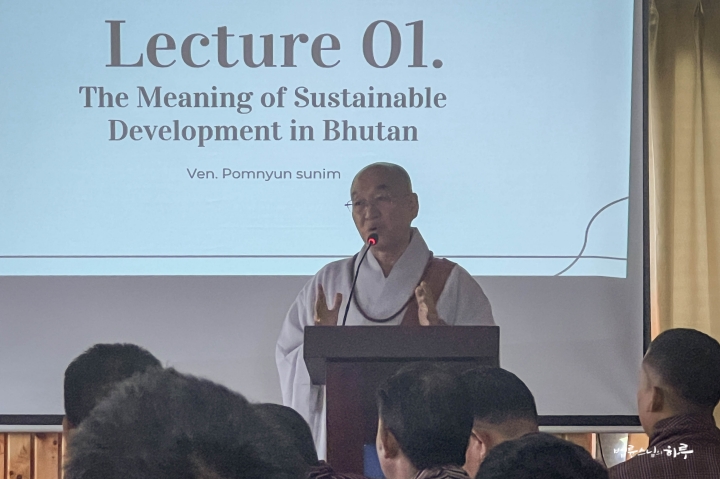
Just before the Buddha passed away, Venerable Ananda asked, ‘We accumulate great merit by making offerings to the Buddha. Once the Buddha is no longer here, how can we accumulate great merit?’ Then the Buddha said, ‘Don’t worry. There are four things that create the same merit as making offerings directly to the Buddha.’ The first is to give food to hungry people and make them full. Yet we often focus more on offering food before stone Buddha statues while ignoring actually hungry people. This doesn’t match the Buddha’s teachings. The second is treating sick people. The third is helping poor people and comforting lonely people. The fourth is supporting those who practice purely. Since monks today don’t practice difficultly in forests like in the old days, we’ve excluded the fourth item from JTS’s practice items.
So JTS makes it core practice to give food to hungry people, treat sick people, and help children learn at the proper time. Especially when we say ‘helping poor people,’ among poor people, those who are too poor to send their children to school can be considered the poorest. All parents want to educate their children. Regardless of religion, whether disabled, any child must learn at the proper time – this is JTS’s belief. So JTS activities are also realizing the Buddha’s last instructions.
I’m doing this project from the perspective of Buddhist work (佛事), that is, making offerings to the Buddha. Jungto Society doesn’t use money donated by members to build buildings or make Buddha statues, but uses it to realize the Buddha’s instructions. We don’t help poor people because we have lots of money. When you become a Jungto Society member, you unconditionally donate $1 every morning during prayer and start the day. The money collected this way is used for these activities.
Until now, JTS has been doing emergency relief and helping the extremely poor. But this Bhutan project is a development project. This is the first attempt to select one dzongkhag and fundamentally eradicate poverty. If JTS were to independently help poor people and build houses here in Zhemgang Dzongkhag, there would be no need for civil servants like you to participate. JTS as an NGO could just handle it. But this project isn’t an NGO project. It’s a program to eradicate poverty throughout the region together with local residents in cooperation with the Bhutanese government. However, it’s a separate project, not a government project. This is a project where you as civil servants develop villages together with residents with JTS support. Since it’s not a government project, your work has increased. And there’s no additional bonus either. So from your perspective, there might be complaints. Therefore, it’s necessary for all of you to set aside the thought of being civil servants and have the mindset of ‘Let’s sincerely try to make our village more beautiful!’ 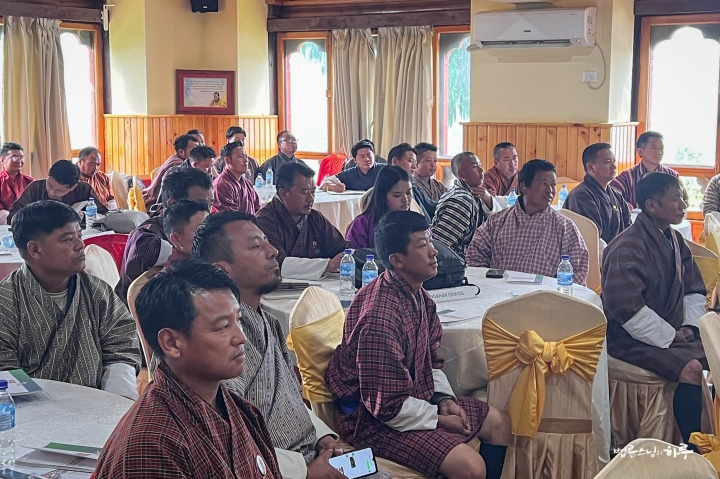
Change That Begins with ‘I Will’ Instead of ‘Please Do It for Me’
At first, I also thought, ‘Wouldn’t it be difficult for the Tshogpa and Gup to ask residents to work?’ This is because the Tshogpa and Gup are elected by the residents, so they have no choice but to be mindful of the residents’ opinions. They get votes by giving things away, not by asking people to work, as residents dislike being asked to work.
Nevertheless, we conducted a pilot project in Kolpu Gewog. When the Gup and Tshogpa told the residents, ‘This is not a government project. The Lama bought these materials for our village,’ the residents responded, ‘Even our relatives don’t help us, but since the Lama is helping us, we should go out and work!’ The residents cooperated better than we had worried. Some residents might misunderstand, thinking, ‘Aren’t the Gup or Tshogpa pocketing the labor costs and making us work?’ This is because there have been no projects conducted in this way until now. That’s why I personally visited all the villages to explain this project.
‘If you have the will to change our village with our own strength, JTS will support you. If you say “I will do it,” we will support you, but if you say “Please do it for me,” there will be no support.’
When I explained it this way, many misunderstandings were resolved. However, since I haven’t met all the residents, I think there are still many misunderstandings. So you need to explain well to the residents. If misunderstandings aren’t resolved even after you explain, JTS volunteers will need to explain directly. If you understand this project well and your desire to ‘make our village better for us Zhemgang residents!’ grows stronger, this project will succeed. On the contrary, if you think ‘It will be difficult to succeed because residents dislike it,’ this project will be difficult to succeed. JTS stands for ‘Join Together Society.’ It’s not about doing things for others, but about doing things together.
This is how we’re trying to make the world more beautiful. I have never asked people to donate for this work. People are moved by seeing my activities and donate. I don’t think I’m supporting Bhutanese residents. We are creating a global community together. When we share the news of what we’re creating together, many people are moved and donate. If this project succeeds within three years, I don’t think it will be very difficult to expand it throughout Bhutan. We just need to let people know, ‘This is what we’re doing.’ But there must be something moving in it. 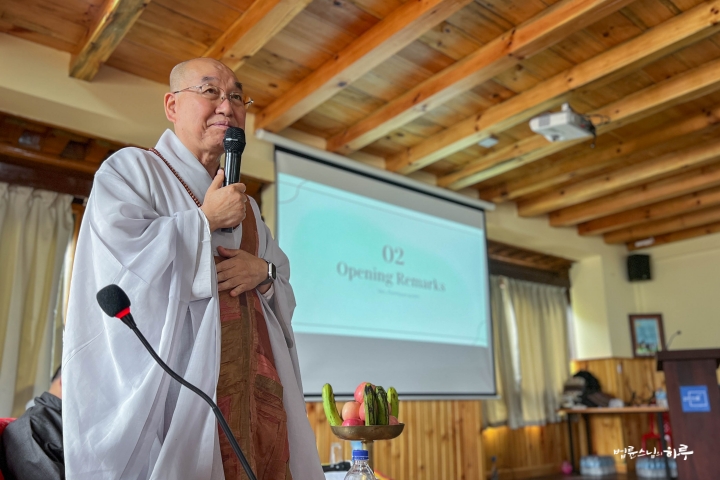
This is a major Buddhist project. If you all carry out this Zhemgang project well, it won’t end with just Zhemgang – we’ll be able to raise funds to support Buddhist projects throughout all of Bhutan. Did you just see the video of the water supply project in Rebati Chiwog? How moving was that? If JTS provided 100 Ngultrum (BTN), the work done by Rebati Chiwog residents would be worth more than 1,000 Ngultrum (BTN).
‘Please Help’ Is Begging, but ‘Let’s Work Together’ Inspires
When JTS members see residents working like that, they think ‘Even if I have to skip a meal, I’ll donate that money.’ When you say ‘please help,’ it becomes an act of begging. What are you lacking that you need to ask others for help? However, when they see you doing Buddhist work and are moved to donate saying ‘please use this for such work,’ that donation becomes not charity but solidarity to achieve a common dream. Only when sincere hearts meet like this does real change occur. I believe we should work this way. Some of you might think, ‘You can do that because you’re a sunim, but we can’t.’ However, I believe you can do it too.
I’ve heard that Bhutan also had this community spirit in the past. These days, they say the community spirit has largely disappeared. But in Kolphu Chiwog, when residents were building roads, villagers who had moved away sent food and provided various support. Let’s build our villages in a direction that revives this community spirit.
The Greatest Change Beginning in the Poorest Village
Of course, the Bhutanese government, including His Majesty, is making great efforts for the residents. However, it takes a long time to bring about real change through government support. We could wait until then. But building houses for those without homes, paving village roads, and repairing field fences – these are things you can do right now if JTS provides the materials. I believe we can fully accomplish this if the Tshogpas, Gups, and administrators just make a small commitment. That’s why I’m making this proposal. Let’s create this together. Let’s remove the dishonor of Zhemgang having the highest poverty rate.”
After the lecture, lunch was served.
From 2:20 PM, they watched the JTS 20th anniversary commemorative video together, followed by guidance on the implementation procedures and budget execution methods for the main project.
Group discussion time immediately followed. Before the discussion, Tshogpas from Chiwogs that had conducted pilot projects over the past year came forward to share their experiences. They vividly shared what was difficult and what went well.
Sunim then opened the door to full discussion by suggesting directions on how participants should set priorities for the projects.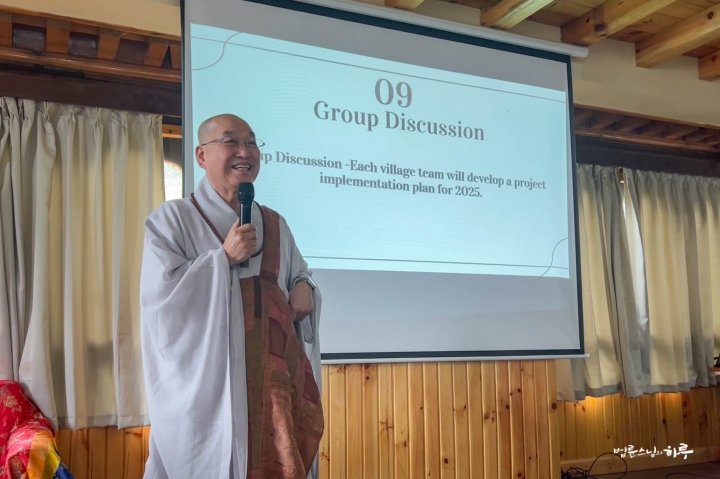
“From now on, we’ll discuss how to improve our Gewogs and Chiwogs, but before that, let me say a few things. First, our goal is to improve residents’ lives. Making people’s living conditions clean and convenient is our first priority.
Small but Certain Changes Built by Residents’ Own Hands
First, you need to visit homes directly and check what problems would arise if you lived in that house. Let’s say I go to a house and stay overnight. I’d have to sleep with the family without any partitions. That would be uncomfortable, wouldn’t it? So we need to make partitions for houses without them. And toilets shouldn’t be too dirty. When you wake up in the morning and need to wash your face but there’s no water, that’s inconvenient. There should be a tap somewhere, whether inside the house or in the yard. When children come home from school dormitories, the house should be at least as good as the dormitory. When grandchildren visit grandmother’s house, it shouldn’t feel dirty. Even if the house isn’t big, it should be clean. If they’re too poor to have bedding, we should provide support. Instead of keeping dishes in baskets, they should have shelves to stack dishes neatly. If they don’t have dishes, dishes should be provided. When you wake up in the morning, you should fold the blankets and put them on shelves. This is how we improve the interior of houses. And the entire village should be clean regardless of whether it’s poor or wealthy.
Improving living conditions is the top priority. It’s not that we won’t address issues beyond living improvements, but we’ll do them after living conditions are improved. I will personally visit and see how you’ve made improvements. Villages that do well will receive more support. However, this work must be done directly by the residents. If you get too greedy and take on too much work, residents will find it too difficult and won’t be able to continue for long. For example, with irrigation channels, you should only partially repair areas with significant water loss. Road repairs should also be done little by little only where really needed. Since residents must do this work, we shouldn’t make it too hard for them. Instead, if residents say they’ll do it, we’ll provide materials so they can do as much as they want. So you need to play your role well between the residents and JTS. If you’re lazy because it’s difficult, the benefits won’t reach the residents, and if you’re too greedy, it becomes hard for the residents. So please balance it well. If there are 3 houses that need to be built, building them all at once would be difficult for residents. Build one house per year as urgently needed. Of course, since each village’s situation is different, I think they could build all at once. I’ll listen to all your presentations shortly and give advice.”
At 3:40 PM, the group discussions began in earnest.
Sunim returned to his accommodation to rest, while participants focused on developing specific implementation plans suited to their village situations. Some wanted to solve drinking water issues, while other villages prioritized toilets or housing improvements as their top priority. Everyone was wholeheartedly committed to the Buddhist work for their villages.
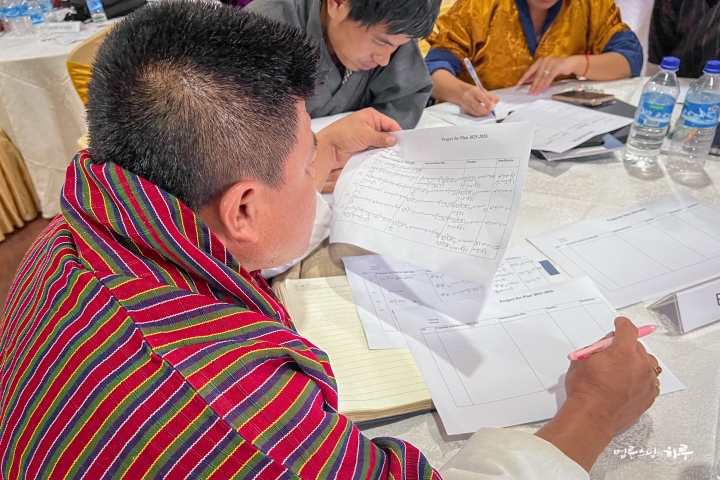
At 5:40 PM, when Sunim arrived at the hall, each Gewog began presenting their ‘2025 Village Development Plan.’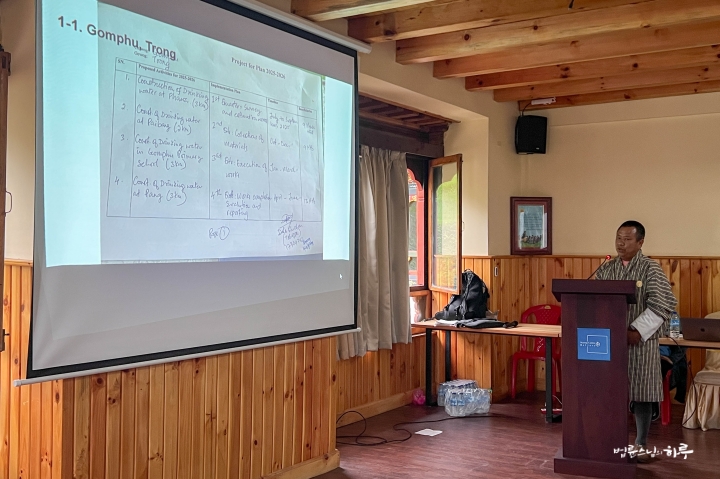
“In our Gompu Chiwog, we will work on 4 water source constructions, build one new house, and pave the walkway in front of the health center.”
Sunim carefully checked each item.
“Can you complete everything within a year?”
“The villages are divided within the Chiwog. It’s fine.”
“Then won’t the Tshogpa be too busy?”
“We can do it. No problem.”
Participants enthusiastically presented their one-year plans reflecting their villages’ realities. Sunim listened to the presentations and carefully reviewed each one.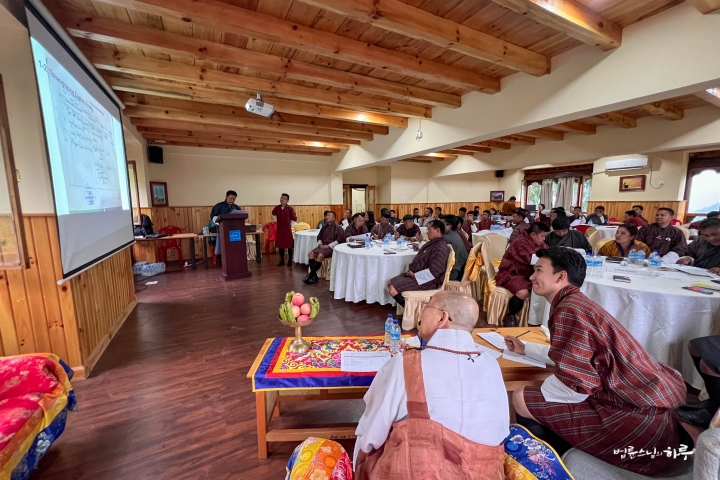
Today, 4 out of 8 Gewogs made presentations. The remaining presentations will be made tomorrow, concluding the first day of the workshop.
From 7:40 PM, a joyful cultural program started. Traditional Bhutanese songs resonated, and participants began dancing in a circle. Initially there were only eight people, but as the music intensified, those sitting began to rise one by one and enter the circle. In the dance where they moved together matching their steps, the village’s community spirit was alive and breathing.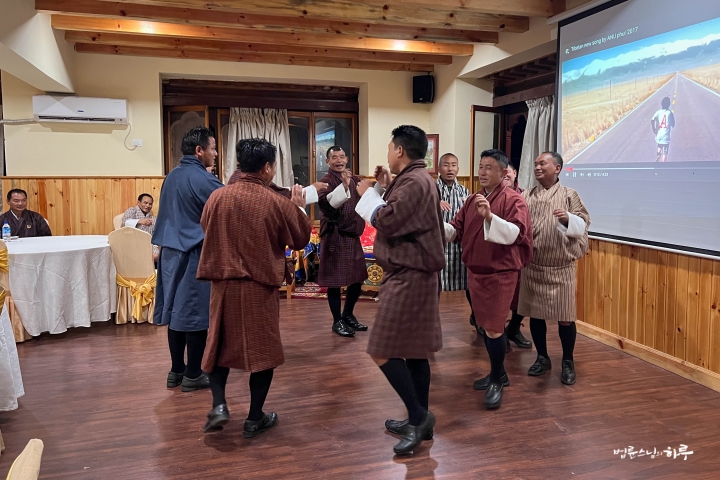
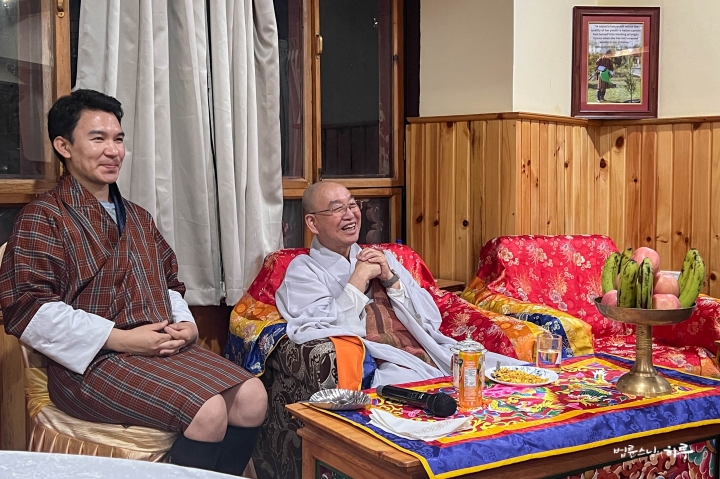
JTS volunteers were also drawn by the Tshogpas’ gestures to take their clumsy steps. As the Tshogpas dancing beside them showed them the hand and foot movements, the Korean volunteers gradually became familiar with the rhythm.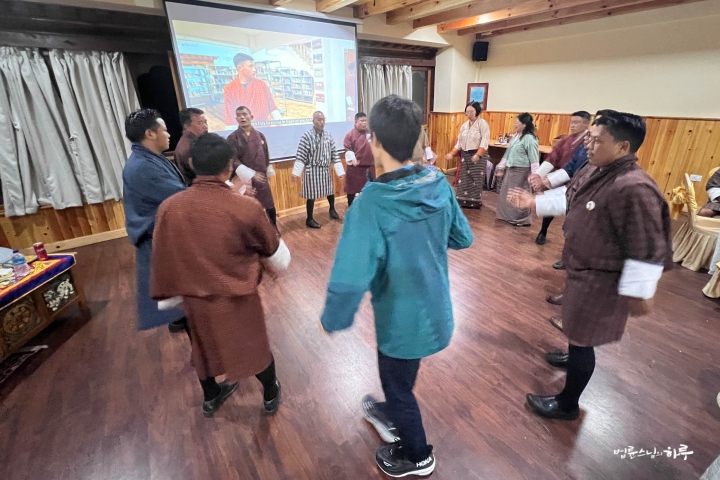
Bhutan has a culture of eating dinner late, so they had dinner at almost 9 PM after the cultural event. After finishing dinner, Sunim returned to his accommodation at 9:30 PM and concluded the day.
Tomorrow, after conducting the second day of the JTS workshop program in Zhemgang, they plan to move to Pantang.





